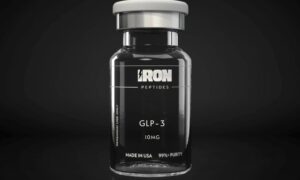If you’re a woman over 40, you’ve likely heard about “the change of life” known as menopause. But what exactly does it mean to go through menopause? In this article we will answer questions on what menopause is, what age it typically starts, what common symptoms women experience and how to stop or reduce unpleasant menopause symptoms.
The menopause marks the end of a woman’s reproductive years as the ovaries gradually produce less estrogen and eggs. Perimenopause, the transition to menopause, usually begins in a woman’s mid to late 40s and menopause itself typically occurs between ages 45 to 55.
As estrogen levels decline, women often experience symptoms like hot flashes, sleep problems, mood swings, vaginal dryness and weight gain changes and natural remedies can help relieve menopause symptoms and make this life transition more manageable.
So if you’re curious to learn the basics about what happens during menopause and how to cope with menopause weight gain, read on for answers and practical advice for getting through “the change” with less stress.
What is Menopause?
The menopause is a natural biological transition that signals the end of a woman’s reproductive years. It occurs when a woman stops menstruating and becomes incapable of pregnancy.
The menopause is caused by a decline in production of eggs in the ovaries, which leads to reduced production of the hormones estrogen and progesterone. As these hormone levels drop, menstruation ceases.
The average age for the onset of menopause is 51 years, though it can range from the early 40s to late 50s. Perimenopause is the transition period leading up to menopause, typically marked by changing hormone levels and symptoms.
What are the Symptoms of Menopause?
The major symptoms of menopause are brought on by the fluctuating hormone levels that accompany the process. Common symptoms include:
- Hot flashes – Sudden feelings of warmth and flushing of the skin, often accompanied by sweating.
- Sleep problems – Difficulty falling asleep or staying asleep, often caused by hot flashes.
- Vaginal dryness – Thinning and dryness of the vaginal tissues due to low estrogen levels.
- Mood changes – Irritability, depression and anxiety are not uncommon during menopause.
- Fatigue and brain fog – Many women experience exhaustion, mental clouding and memory issues.
- Changes in libido – Decreased sex drive is a common symptom due to hormonal changes.
- Joint and muscle aches – Estrogen helps maintain collagen in joints and muscles.
- Weight gain – Falling estrogen levels can make it harder to lose and maintain a healthy weight.
- Urinary problems – Frequent urination and urinary incontinence are symptoms due to thinning vaginal tissues.
What Vitamins and Minerals Should you Take?
Certain nutrients can help alleviate symptoms and improve overall health during menopause. These include:
- Vitamin D – Low levels of vitamin D are common in menopausal women. Getting enough helps regulate mood and supports bone health, which declines during menopause.
- Calcium and Vitamin K2 work together to maintain bone density as estrogen levels drop. Aim for 1000 to 1200 mg of calcium and 150 to 200 mcg of vitamin K2 daily.
- Magnesium – Helps regulate hormones and combat fatigue. Good dietary sources include spinach, pumpkin seeds and almonds.
- Vitamin B6 – Helps balance hormone levels and combat symptoms like mood swings, depression and fatigue.
- Omega-3 Fatty Acids – EPA and DHA omega-3s support brain health, combat inflammation and improve mood. Opt for oily fish or EPA/DHA supplements.
- Black Cohosh – An herbal supplement that has been shown to relieve symptoms like hot flashes, night sweats, mood changes and vaginal dryness.
- Soy Isoflavones – Found naturally in soy foods, isoflavones have weak estrogenic activity that may alleviate symptoms. Opt for supplements standardized to provide 50 to 90 mg of isoflavones per day.
Do Probiotics Helps Ease the Symptoms of Menopause
Here is the information on how probiotics can help menopausal women in continuous paragraphs:
Taking a good probiotic supplement can provide numerous benefits for women over 50 who are going through menopause. The gut microbiome plays an important role in influencing hormone production and metabolism, and probiotics help maintain a balanced community of bacteria in the gut. This can support healthier hormone levels during menopause when estrogen production is declining.
Some research has found that certain probiotic strains, particularly various Lactobacillus species, may help reduce the frequency and severity of hot flashes in menopausal women. However, the exact mechanisms of how probiotics impact hot flashes are still being studied. By promoting proper digestion and elimination, probiotics can also help combat some of the other common menopause symptoms like bloating, constipation and water retention that are caused by hormonal changes.
Since estrogen levels drop during menopause, women become more prone to vaginal infections. Probiotics replenish the healthy bacteria in the vagina that keep it balanced and resistant to infections. Probiotics may additionally ease symptoms of anxiety and depression that often emerge during menopause through their positive effects on the microbiome and the “gut-brain axis”. A diverse gut microbiota is linked to healthier mood and emotions.
Both osteoporosis and cardiovascular disease risks rise after menopause due to declining estrogen. Probiotics can provide benefits in this regard through their ability to reduce inflammation and influence gut-related factors that impact bone and heart health. Finally, probiotics may help promote better sleep for menopausal women through their positive effects on digestion, mood and inflammation – all of which influence sleep quality. Sleep issues are notoriously common during menopause.
What Lifestyle Changes Can Ease Menopause Symptoms
Here are some lifestyle changes that can help ease menopause symptoms:
- Exercise regularly – Both aerobic exercise and strength training can help relieve symptoms like hot flashes, mood changes, sleep problems and weight gain. Aim for at least 30 minutes of exercise most days.
- Maintain a healthy diet – A diet rich in whole foods, plant-based proteins, and limited processed foods and sugar can help stabilize hormones and provide nutrients to alleviate symptoms.
- Quit smoking – Smoking makes menopause symptoms worse and contributes to long-term health risks. Quitting can help relieve hot flashes and improve mood.
- Limit caffeine and alcohol – Both caffeine and alcohol can worsen hot flashes, sleep issues and other symptoms. Try to cut back or consume in moderation.
- Practice stress reduction – Techniques like yoga, meditation and deep breathing can help balance hormones and combat anxiety related to menopause. Even simple relaxation practices help.
- Get enough sleep – Aim for 7 to 8 hours per night to regulate hormones and metabolism. Sleep disturbances are common during menopause so establish a bedtime routine.
- Stay socially active – Connecting with friends and family and staying involved in your community can relieve stress and boost mood. Join an activity group.
- Use lubricants during sex – Dryness caused by low estrogen can make sex uncomfortable. Lubricants and moisturizers can counteract vaginal dryness.
- Consult a health professional – Your doctor, gynecologist or a licensed healthcare provider can identify any concerning symptoms and recommend treatments if needed.
Lifestyle changes are a good first step for many women in alleviating symptoms of menopause. But hormone therapy or supplements may also be necessary in some cases. Always consult your healthcare provider to determine the best treatment plan for your specific needs and concerns.
MenoPause Misconceptions
There are several common misconceptions about menopause:
- Menopause is a disease – Menopause is a natural phase of a woman’s life, not an illness. While it can cause uncomfortable symptoms, it is not a medical condition.
- Menopause means the end of sex – While libido can decline, many women continue to have active and fulfilling sex lives during and after menopause. Symptoms like vaginal dryness can be addressed.
- Hormone treatment is the only option – Lifestyle changes like diet, exercise, and stress management can help relieve many menopause symptoms. Herbal remedies and supplements are also options.
- Menopause makes women moody and irritable – While some mood issues like anxiety and depression are common, they are not inevitable. Many women go through menopause with minimal effect on their mood and personality.
- Menopause causes memory loss – Some “brain fog” is common during menopause, but true memory loss and cognitive decline are not usually related to hormonal changes. Other factors may be at play.
- All women gain weight during menopause – Many, but not all, women experience weight gain as estrogen levels drop. However, lifestyle factors like diet and exercise are bigger contributors to menopausal weight gain.
- Symptoms are the same for all women – Every woman experiences menopause differently. Some have mild symptoms while others have more severe issues. Symptoms also vary in type and duration for different women.
- Menopause happens suddenly – Perimenopause, the transition phase, typically lasts 4-8 years before full menopause occurs. Symptoms tend to develop and change gradually over this time.
Menopause Weight Gain Summary
Many women gain unwanted pounds as they transition through menopause. Hormonal changes, slowed metabolism, and lifestyle factors contribute to this menopausal weight gain.
As estrogen levels drop during menopause, a woman’s basal metabolic rate decreases. This means the body burns fewer calories at rest. Estrogen also helps regulate how the body stores and utilizes fat. Lower levels make it harder to lose weight and maintain a healthy weight.
The body composition of menopausal women tends to shift from lean muscle to a higher body fat percentage. Fat is more likely to accumulate in the abdomen, leading to a thicker waistline. This “menopausal spread” is linked to higher health risks.
Hot flashes and disturbances common in menopause disrupt sleep quality, impacting metabolic rate and hormone function. Poor sleep is also associated with overeating and cravings for unhealthy food.
Lifestyle changes are often to blame for menopausal weight gain. As women enter this life stage, they may become less physically active and develop unhealthy eating habits. Stress levels often rise due to job changes or family obligations.
To prevent or minimize weight gain during menopause:
- Maintain a healthful diet focused on lean protein, low glycemic carbs, and fiber
- Engage in resistance training and cardio exercise 3 to 4 times weekly
- Prioritize enough high-quality sleep
- Reduce stress through meditation, yoga, and social support
- Focus on a healthy lifestyle rather than targeting a number on the scale.
In summary, hormonal changes, slowed metabolism, and lifestyle factors contribute to menopausal weight gain. Making smarter food choices, incorporating regular exercise, and managing stress can help offset the impact of declining estrogen on a woman’s waistline.



































